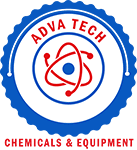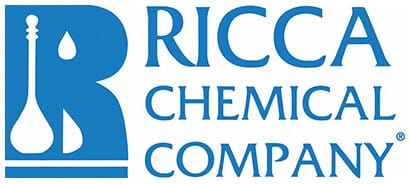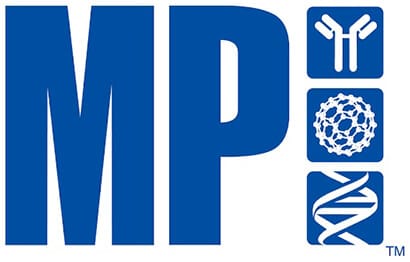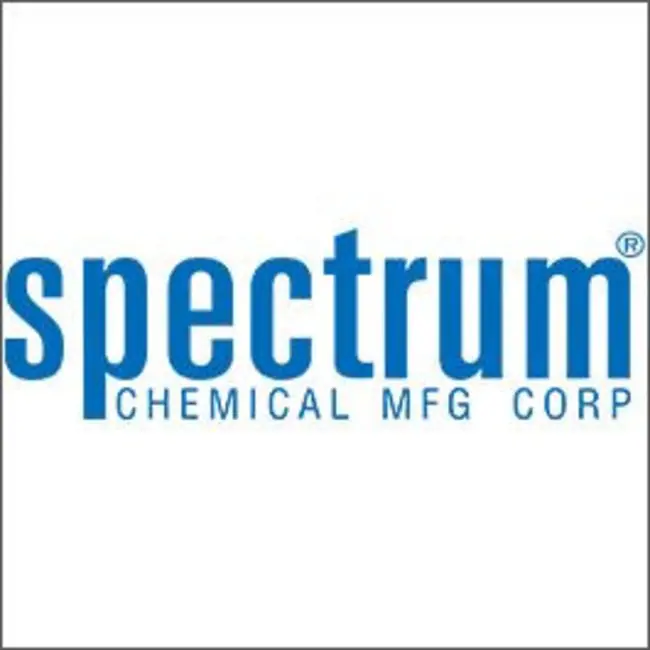1ml Resin (Total 2 ml)
Showing all 10 results
-
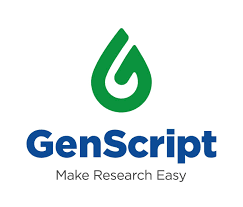
Anti-DYKDDDDK Affinity Resin Easy
$325.16 Add to cart View Product DetailsGenScript Anti-DYKDDDDK Affinity Resin Easy (Cat. No. L00907) features high binding capacity, specificity, sensitivity, stability, and reusability, making it particularly useful for the affinity purification and immunoprecipitation of DYKDDDDK-tagged fusion proteins expressed in common protein expression systems such as bacteria, yeast, and mammalian cells.
-
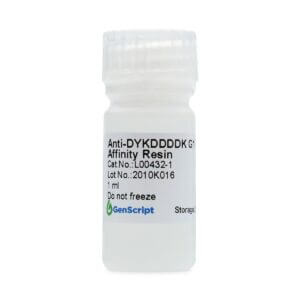
Anti-DYKDDDDK G1 Affinity Resin
$250.13 Add to cart View Product DetailsGenScript Anti‐DYKDDDDK G1 Affinity Resin (Cat. No. L00432) is designed for the purification of DYKDDDDK‐tagged protein from commonly used protein expression systems including bacteria, yeast and mammalian cells.
-
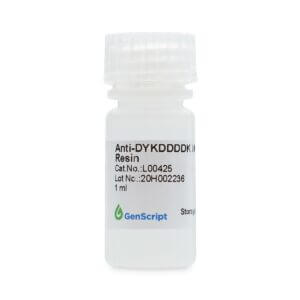
Anti-DYKDDDDK IP Resin
$176.81 Add to cart View Product DetailsGenScript Anti-DYKDDDDK IP Resin is designed for quick and efficient immunoprecipitation of DYKDDDDK-tagged protein or DYKDDDDK-tagged protein-target protein complex. The resin is an agarose beads coupled to Mouse anti-DYKDDDDK monoclonal antibody (clone 6H8E4). The antibody recognizes N-terminal, internal and C-terminal fusion protein containing DYKDDDDK tag. It is supplied as a suspension in 50 % glycerol containing 10 mM sodium phosphate, 150 mM sodium chloride, pH 7.4,0.02 % (w/v) sodium azide (PBS/A).
-

Anti-GS Linker Affinity Resin FF
$327.75 Add to cart View Product DetailsThis product is designed for purification of proteins, antibodies and compounds containing (GnS)m linker (n≥2, m≥2) from commonly used protein expression systems such as bacteria, yeast and mammalian cells.
-

Anti-HA IP Resin
$345.00 Add to cart View Product DetailsPrinciple
Add the sample containing the HA-tagged protein
to the Anti-HA IP Resin and allow the protein bind to the Resin during a short
time incubation. Then the HA-tagged protein can be eluted off the beads, or
used directly for pull-down of target protein.
Material Supplied
Genscript Anti-HA IP Resin is an agarose beads
coupled to THE™ HA Tag Antibody, mAb, Mouse (Genscript, A01244).
The antibody recognizes C-terminal, N-terminal, and internal HA tagged-fusion
proteins. It is supplied as a suspension in 50% glycerol containing 10 mM sodium phosphate, 150 mM
sodium chloride, pH 7.4, 0.02 % (w/v) sodium azide (PBS/A).
Storage and Stability
Store the resin: Anti-HA IP Resin is supplied at
-20°C.Do not store the gel at freezing temperatures in the absence of glycerol.
Store the Column: Wash the column three times
with 5 ml of TBS/A (TBS containing 0.02 % sodium azide) then add another 5 ml
of TBS/A and store at 2-8°C without draining.
Additional Buffers Needed
Equilibration buffer: 50 mM Tris, 150 mM NaCl, pH 7.4.
1×SDS Sample Buffer: 62.5 mM Tris-HCl (pH 6.8 at
25°C), 2% w/v SDS, 10% glycerol, 50 mM DTT, 0.01% w/v bromophenol blue. -
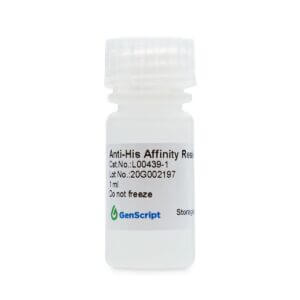
Anti-His Affinity Resin
$354.49 Add to cart View Product DetailsGenScript Anti-His Affinity Resin is designed for purification of His-tagged protein. It is composed of agarose and conjugated THETM anti-His monoclonal antibody. His-tagged protein in the crude samples can bind to the anti-His monoclonal antibodies coupled with the agarose, and the nonspecific proteins can be eliminated by washing. As a result, the His-tagged protein will finally be eluted with high recovery. Moreover, this product can be used for immunoprecipitation of His-tagged protein.
-

MonoRab™ Anti-Camelid VHH Affinity Resin
$409.69 Add to cart View Product DetailsCamelid
VHH Antibody (also called single-domain antibody, sdAb or Nanobody by Ablynx)
is a peptide chain about 110 amino acids in length, containing one variable domain
of a heavy-chain antibody (a VHH fragment). Like a whole antibody, the camelid
VHH antibody is able to bind selectively to a specific antigen. This single-domain
antibody has a broad range of applications in biotechnical and therapeutic research
fields due to its small size, simple production and high affinity.
GenScript’s MonoRab™ Anti-Camelid VHH
Affinity Resin (Cat. No. L00905) is designed for purification of Camelid VHH
single domain antibody from commonly used protein expression systems such as bacteria,
yeast and mammalian cells. The VHH single domain antibody in cell lysate can specifically
bind to the Anti-Camelid VHH monoclonal antibody coupled to the resin. Nonspecific
binding reactions are eliminated by stringent washing steps, and the purified Camelid
VHH single domain antibody is eluted with a high recovery rate. Table
1 lists the main characteristics of GenScript’s MonoRab™ Anti-Camelid VHH
Affinity Resin.
Table 1. Characteristics of Anti-Camelid VHH Affinity
ResinProduct
content50%
settled resin in TBS with 0.02%
sodium azideMatrix 4% cross-linked
agaroseAverage
bead size90 μm Ligand MonoRab™
Rabbit Anti-Camelid VHH Antibody, mAbBinding
capacityApproximately
2-4 mg Camelid VHH protein per mL
settled resin (depending on amino acid sequence of different Camelid VHHs)Storage
and stabilityStore
at 2-8 °C for up to 12 months. Do not freeze the resin.Resin
reuseWhen
stored at 2 – 8° C, the resin can be recycled at least 5 times
with no loss of binding capability. The resin can be reused up to 10 times with
minimum loss of binding capability.Elution
methodAcid
buffer elution (pH 2.5)Reagents
compatibilityCompatible
with commonly used bacterial lysis reagents. For reagents compatible with
purification, see tables 2 and 3 in the manual. -

MonoRab™ Anti-DYKDDDDK Affinity Resin
$332.93 Add to cart View Product DetailsGenScript’s MonoRabᵀᴹ Anti-DYKDDDDK Affinity Resin is designed for optimal purification of DYKDDDDK-tagged proteins. DYKDDDDK tag is an octapeptide tag that can be added to a protein using recombinant DNA technology. It can be fused to the N-terminus or C-terminus of a target protein to facilitate detection and purification. Based on our new rabbit monoclonal antibody technology (MonoRabᵀᴹ), this resin offers high binding capacity, high purity, and resistance to high concentrations of salt or acid during protein purification. The binding capacity of MonoRabᵀᴹ Anti-DYKDDDDK Affinity Resin is 1.5 mg DYKDDDDK-tagged protein per mL of settled resin. The recombinant proteins expressed in bacterial or mammalian cells cultures specifically bind to the anti-DYKDDDDK monoclonal antibodies coupled to the resin, resulting in highly pure eluates. The resin can withstand stringent washing steps, especially with buffers containing high concentration of salt. The resin is resistant to up to 2 M NaCl, and to buffers with pH as low as 2.5.
-

MonoRab™ Anti-Humanized VHH Affinity Resin FF
$409.69 Add to cart View Product DetailsCamelid
VHH Antibody (also called single-domain antibody, sdAb or Nanobody by Ablynx)
is a peptide chain about 110 amino acids in length, containing one variable
domain of a heavy-chain antibody (a VHH fragment). Like a whole antibody, the camelid
VHH antibody is able to bind selectively to a specific antigen. This single-domain
antibody has a broad range of applications in biotechnical and therapeutic research
fields due to its small size, simple production and high affinity. However, their sequences may increase the risk of immunogenicity and
anti-drug antibody (ADA) development in humans, and thus, sdAbs are routinely
humanized during development.
GenScript’s MonoRab™ Anti- Humanized VHH Affinity
Resin FF (Cat. No. L00951) is designed for purification of humanized VHH
single domain antibody from commonly used protein expression systems such as bacteria,
yeast and mammalian cells. The VHH single domain antibody in cell lysate can specifically
bind to the Anti- Humanized VHH monoclonal antibody coupled to the resin. Nonspecific binding
reactions are eliminated by stringent washing steps, and the purified target
protein is eluted with a high recovery rate. Table 1 lists the main characteristics
of GenScript’s MonoRab™ Anti- Humanized VHH Affinity Resin FF.
Table 1. Characteristics of Anti-Humanized VHH
Affinity Resin FFProduct
content50%
settled resin in TBS with 0.02%
sodium azideMatrix 4% highly
cross-linked agaroseAverage
bead size90 μm Ligand MonoRab™
Anti-Humanized VHH AntibodyBinding
capacity>
2 mg Humanized VHH per mL settled resin (depending on amino acid sequence of
different Humanized VHHs)Storage
and stabilityStore
at 2-8 °C for up to 12 months. Do not freeze the resin.Resin
reuseWhen
stored at 2 – 8° C, the resin can be recycled at least 5 times
with no loss of binding capability. While, it can be reused up to 10 times with
minimum loss of binding capability.Elution
methodAcid
buffer elution (pH 2.5)Reagents
compatibilityCompatible
with commonly used bacterial lysis reagents. For reagents compatible with
purifications, see tables 2 and 3 in the manual. -

ToxinEraser™ Endotoxin Removal Resin
$51.75 Add to cart View Product DetailsLipopolysaccharide
(LPS) is a bacterial endotoxin, and a major constituent of the cell walls of
gram-negative bacteria. During gram-negative bacteremia or endotoxemia, LPS is
the principal pathophysiological mediator by which bacteria can cause
hypotension, organ failure, disseminated intravascular coagulation, and fatal
shock in mammalian hosts. The removal of these endotoxins is highly necessary
for downstream processes.
The ToxinEraser™
Endotoxin Removal Resin utilizes immobilized polymixin B to bind and remove
pyrogens from solution. The polymixins are a family of antibiotics that contain
a cationic cyclopeptide with a fatty acid chain. Polymixin B neutralizes the
biological activity of endotoxins by binding to the lipid A portion of
bacterial lipopolysaccharide.
